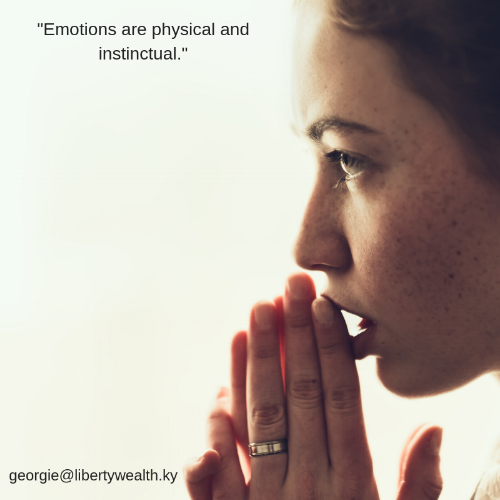Where do emotions come into it?
My business is built on the knowledge that money and investing is emotional and as long as humans walk this planet, they will need help managing their emotions.
However, some people don't like to think of themselves as emotional. It's just money right? How could I feel anything about it? It's just the stock market right? How could I start getting emotional over the price of companies?
They are wrong to think they are not emotional about money. We all are emotional, but for many of us it doesn't involve tears. It involves behavioural biases that most people don't even know exist. And this is a huge problem because without understanding that these biases exist, it's impossible to protect yourself from them.
Morgan Housel, one of my favourite writers, just released a post titled 'Concealed Emotions'. It really made me think hard about this term 'emotions' and how semantics might be getting in the way. I am not sure I could define what an emotion is, could you? Is it the same or different from a feeling? I do know that both emotions and feelings drive behaviour and that's when we run into trouble in investing.
After a little research, I discovered that emotions are the precursor of feelings. Emotions are more physical and instinctual in their nature. They are what stopped our ancestors from getting eaten by a lion on the plains of Africa. A rustle in the undergrowth and the immediate and instinctive reaction was to run. That was "the fear" emotion playing out. There was no time for feelings.
And so it is today. Our emotions are really difficult to control because the fight-or-flight response is ingrained in us. Debbie Hampton, author of The Best Brain Possible, writes:
“Emotions are lower level responses occurring in the subcortical regions of the brain, the amygdala, and the ventromedial prefrontal cortices, creating biochemical reactions in your body altering your physical state. They originally helped our species survive by producing quick reactions to threat, reward, and everything in between in their environments. Emotional reactions are coded in our genes and while they do vary slightly individually and depending on circumstances, are generally universally similar across all humans and even other species.”
So how does this matter when it comes to our money and investing?
Well, in the last few years neuroscience has started to unveil what happens in our brains when we are trying to assess the value of rewards, interpret probabilities and estimate risks. As Jason Zweig (columnist at the Wall Street Journal) says - these things are the very essence of investing.
Going back to our ancestors, if they underestimated the risk of the rustle in the undergrowth, they had a real chance of becoming lion food. The amygdala (the part of our brain responsible for that fear) still works in the same way today - a sudden surprise in your environment such as a loud bang illicits the same response.
Fascinatingly, neuroscientists have found that the amygdala responds in the same way when we are losing money. And in fact, you don't actually have to be losing money in order to have a response in your amygdala, the expectation of losing money is enough!
If our ancestors responded with a 'fight-or-flight' reaction to a rustle in the undergrowth that turned out to be nothing more than the wind, they lived to see another day. There was no harm done. However, when we react to a false alarm in investing with a 'fight-or-flight' reaction we can blow up our entire financial future with one decision. Most commonly this manifests itself in panic when the market is falling, selling out right at the bottom and then missing the entire recovery.
In his 'Concealed Emotions' article, Morgan goes through some things that investors do that are emotional, even though they might not seem emotional on the surface. For example, forecasting, displaying confidence, being optimistic or pessimistic, comparing ourselves to others, having ambition. These are all emotional behaviours.
Making predictions or forecasting the future is an interesting one. I talk about the perils of this a lot. According to Jason Zweig we are hard-wired to do it. After millions of years of evolution, our brains automatically, unconsciously and involuntarily look for patterns in our environment because that's what helped us survive.
Jason writes:
“If you show people a sequence of anything — numbers, colors, shapes, letters, faces — and tell them that the arrangement is random, they will insist on believing that they can predict the next item in the series.
Technical analysts insist that charts of past prices can predict the path of future returns — and every Wall Street strategist thinks he can forecast where the market is headed, especially when you seat him in front of a TV camera.
At heart, all of us (even market strategists) know that these things are utterly unpredictable. So why do we persist in trying to predict them?
It turns out that we have no choice”
My point after all of this is that we are all emotional when it comes to our money. It is literally impossible not to be. The key is to be aware of what is going on unconsciously in our brain, as only then can we start to protect ourselves from it.
Benjamin Graham (one of the greatest investors of all time) once said 'the investor's chief problem - even his worst enemy - is likely to be himself'. Many years later neuroscience is proving that he was totally right.
georgie@libertywealth.ky

